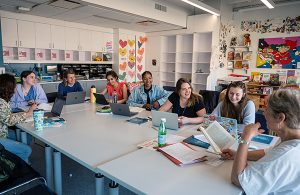Master’s Degree Program in
Reading and Literacy
Specialize in Reading and Literacy Across Grades
In response to a growing national demand for highly prepared reading specialists and literacy coaches, as well as changes in New York State’s certification requirements, Bank Street Graduate School of Education has redesigned its master’s in literacy education program to focus on teaching reading to children and adolescents across all grades, from kindergarten through high school.
This master’s degree program is for individuals with a New York State classroom teaching certification (with the exception of career and technical certifications) and leads to an additional K-12 certification as a literacy specialist. You’ll be prepared to work as a reading intervention teacher, a school-based leader in literacy, and a classroom teacher with increased expertise and leadership in literacy.
 Advance Your Career with Flexibility, Support, and Community in Just 18 Months
Advance Your Career with Flexibility, Support, and Community in Just 18 Months
- 33-credit program you can complete in 18 months while teaching in your current position
- Small class size and community that promote collaboration, in-depth learning, and individualized coaching
- The flexibility of starting in January or September
- Scholarships and financial aid opportunities
Teach Literacy with Culturally Responsive, Evidence-Based Practices
Using multicultural literature as a foundation for teaching literacy, you’ll deepen your teaching practices and learn how to develop culturally responsive curricula. Through your coursework, you will:
- Learn how to integrate peer-reviewed reading theory and research with evidence-based teaching methods
- Examine foundational topics about oral language development, phonemic awareness, decoding and phonics, reading comprehension, writing, and assessments designed to guide differentiated instruction
- Learn how to teach students with a range of reading profiles across elementary, middle school, and secondary school grade levels, including multilingual and neurodiverse learners
- Explore the larger socio-cultural contexts of literacy education, including an historical review of reading methods and its most recent iteration, known as the Science of Reading
- Critically analyze the literacy programs currently used in schools to help integrate culturally responsive methods for children’s learning
Develop Your Skills with Supervised Fieldwork
Your fieldwork will be supervised by a core Bank Street faculty advisor who will observe your progress through on-site visits where you will reflect on the skills you need to refine and the goals you want to advance. During the practicums, you’ll meet with your peers to explore problems of practice and professional topics in the field of literacy education.



